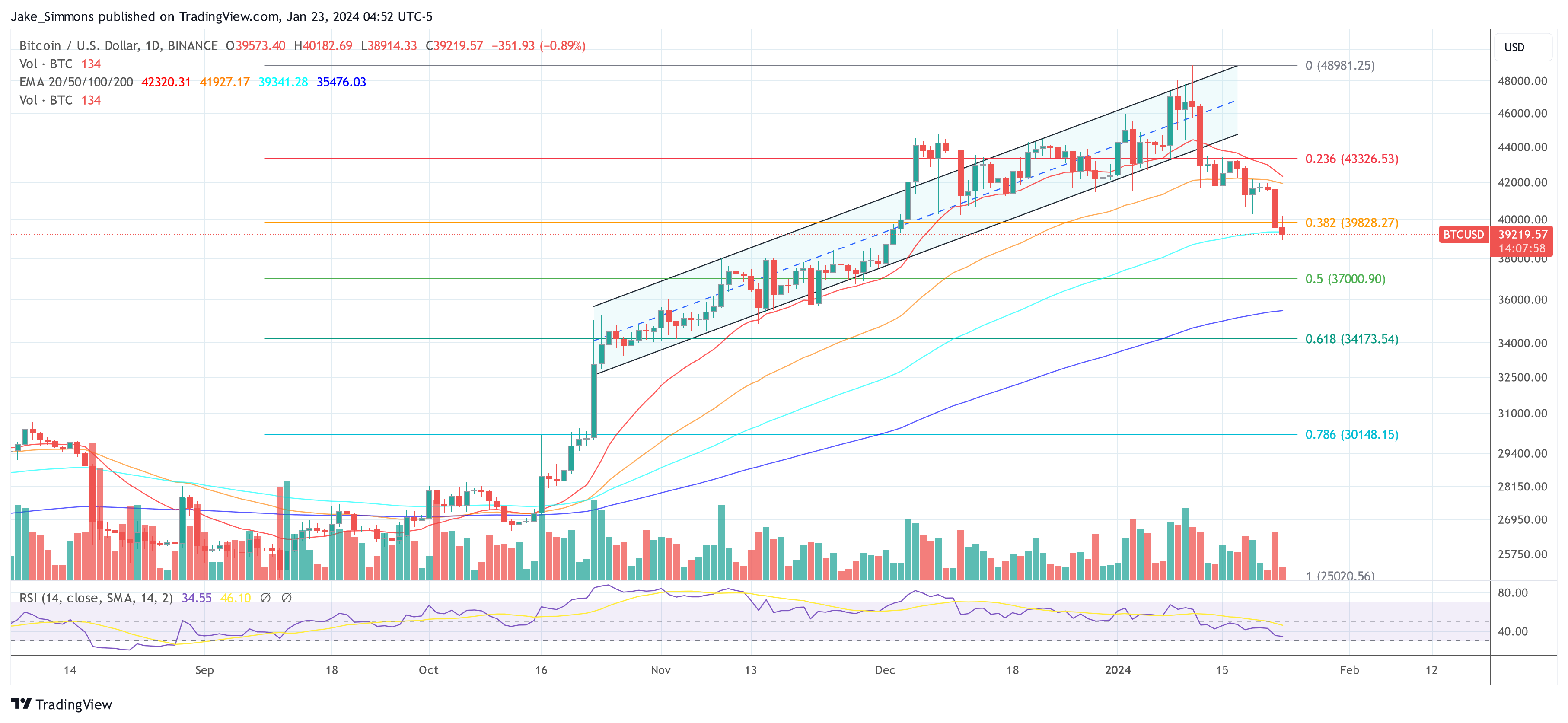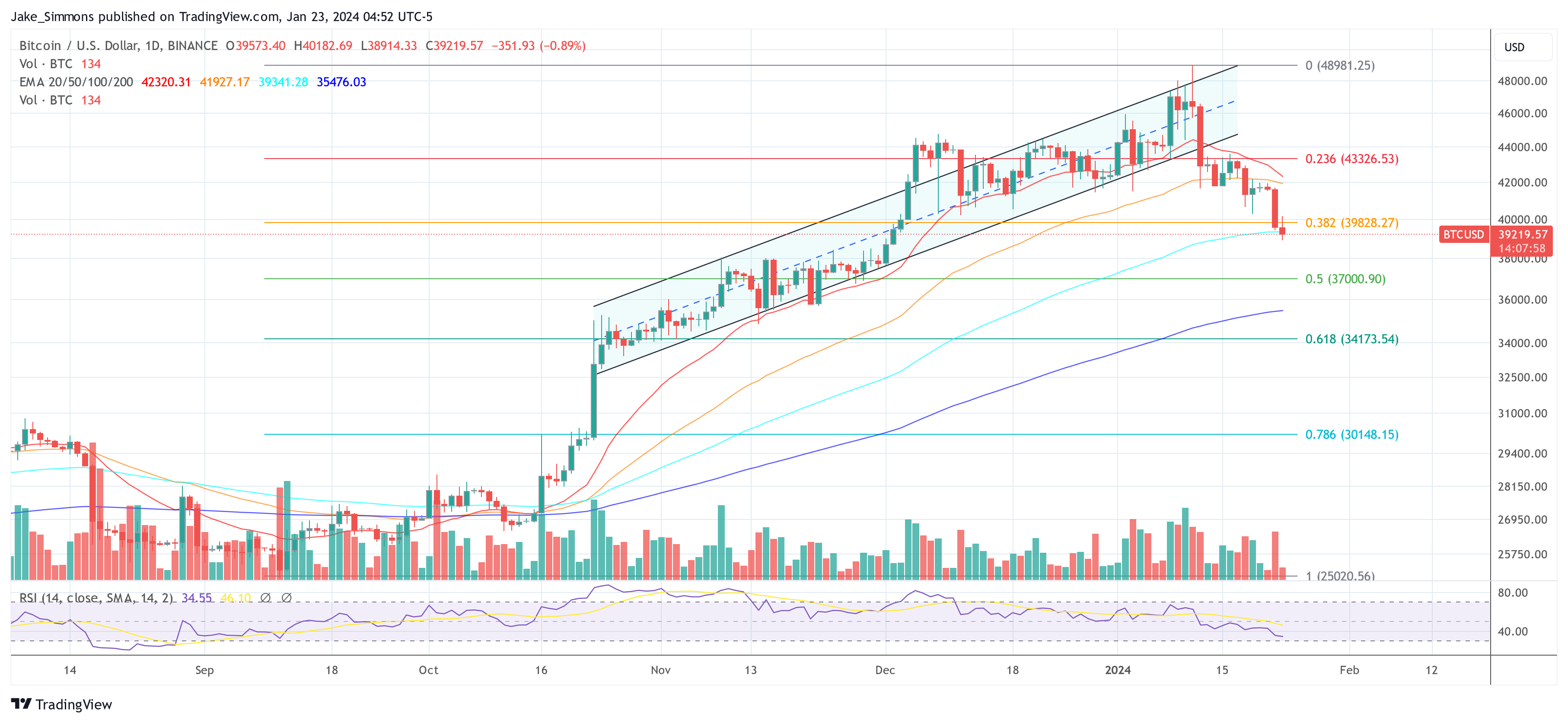The Bitcoin price has plummeted below the $39,000 mark, the lowest level since December 2. This significant drop can be attributed to three main factors that have collectively contributed to the current market sentiment and price action.
#1 Selling Pressure From Grayscale’s GBTC Outflows
The market has been heavily influenced by the continuous outflows from the Grayscale Bitcoin Trust (GBTC). Bloomberg analyst James Seyffart commented on the severity of the situation, stating, “Woof. BAD day for Bitcoin ETFs overall in the Cointucky Derby. GBTC saw over $640 million flow out today. Outflows aren’t slowing — they’re picking up. This is the largest outflow yet for GBTC. Total out so far is $3.45 Billion.”
Nevertheless, the volume on the Bitcoin ETFs remained very strong, surpassing $2 billion, with GBTC accounting for over half of this volume. The total volume for the first seven trading days approached $19 billion.
Interestingly, while GBTC experienced significant outflows, the broader spot Bitcoin ETF landscape paints a different picture. Excluding Grayscale, the nine new ETFs have collectively amassed 95,000 Bitcoin ($3.8 billion), in stark contrast to the 65,000 Bitcoin ($2.9 billion) that flowed out of GBTC.
22,000 BTC have been from selling from the FTX Estate, meaning not flowing into others. While the cessation of this supply overhang is generally positive for the market, it remains crucial to monitor whether the outflows from Grayscale persist or intensify, even after the conclusion of the FTX-related sell-offs.
#2 Futures And Options Markets Cool Down
A significant contributor to Bitcoin’s price movement below $39,500 is the cooling of activity in the futures and options markets. Notably, the open interest in CME Bitcoin futures experienced a sharp decline, shedding over $1.64 billion following the approval of spot BTC ETFs, indicating a reduction in market leverage and speculative interest.
Crypto analyst Skew provided a nuanced analysis of the market dynamics, particularly focusing on the interplay between Bitcoin’s perpetual futures (perps) and the spot market. Skew noted, “Nothing too conclusive yet in perps market other than shorts becoming the dominant position in the market currently. Perp premiums often occurring during periods of spot limit selling into price. Spot premiums notably when perps push price into areas of limit bids on spot exchanges.”
This observation points to a shift towards bearish sentiment in the perps market, with short positions taking precedence. The analyst also highlighted the current market’s lack of volatility and urgency, attributing it to decreased open interest and a focus on spot market flows.
Further shedding light on the market sentiment, options analytics platform Greeks.live added insights into the options market, particularly the behavior of Bitcoin’s implied volatility (IV) and the volatility risk premium (VRP). They noted, “Bitcoin fell below the $40,000 as short-term IVs recovered. Overall VRP has risen, and the Skew curve is skewed towards put options.”
This shift towards put options signifies an increase in market participants hedging or betting on further downside, thus contributing to the bearish sentiment. However, Greeks.live also pointed out that despite the bearish forces and the presence of panic orders, the overall market is still witnessing a balanced game between bulls and bears.
#3 Sentiment Shift – Calls For $35,000 Get Louder
The third pivotal factor influencing Bitcoin’s price drop below $39,500 is a notable shift in market sentiment, emphasizing the need for a correction after a prolonged bullish period. Charles Edwards, the founder of Capriole Investments, articulated the market’s current state, highlighting the abnormality of the recent price trends and forecasting an inevitable return to volatility.
Edwards stated, “We’re still not here yet. This pullback is very overdue and lower is healthier.” He pointed out the rarity of the current market conditions, noting, “It’s now been over 232 days since Bitcoin had a 25%+ drawdown in the prior 12 months. The last time this happened was more than a decade ago, in 2011! The current low downside volatility period is NOT normal. These dips usually occur every 2-3 months. Volatility will return.”
The recent price correction, although perceived as a healthy and overdue adjustment by analysts, has nevertheless instilled a sense of panic among traders and investors. The market’s sentiment has taken a negative turn, especially as Bitcoin experiences a -20% dip, a movement partly attributed to the overhang of Grayscale’s supply.
The once robust bullish optimism has waned, giving way to louder calls for a further decline to $35,000 or even lower. This shift in sentiment is quantitatively reflected in the Bitcoin Fear & Greed Index, which has moved to a neutral position of 50, marking a significant departure from the extreme greed observed during the uptrend.
At press time, BTC traded at $39,219.


